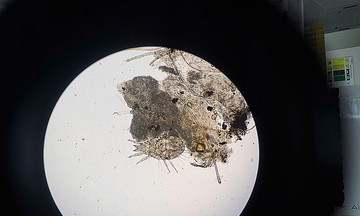Answer:
Allergic rhinitis is a condition where the nose becomes irritated and inflamed, not due to viruses or bacteria, but rather environmental triggers (allergens) such as pollen, animal dander, insect debris, dust mites, smoke, and dust. Symptoms include an itchy nose, sneezing, nasal congestion and runny nose, red and itchy eyes, watery eyes, and thick nasal discharge.
Allergic rhinitis occurs when the body overreacts to exposure to allergens. Upon initial contact, the immune system identifies the allergen and produces specific antibodies called IgE. During subsequent exposures, IgE antibodies bind to mast cells in the nasal lining. These cells immediately release histamine, causing symptoms such as sneezing, itching, and a runny nose. They also release other mediators like leukotrienes, prostaglandins, and cytokines, which prolong the inflammatory response, leading to nasal swelling, difficulty breathing, and persistent symptoms.
Factors that can exacerbate allergic rhinitis include chemicals, weather changes, air pollution, tobacco smoke, perfumes, pollen, and dust. Individuals with a history of allergies (eczema, asthma) or a family history of allergies are at higher risk. Exposure to chemicals, textile fibers, or industrial dust also increases the risk of developing or worsening allergic rhinitis.
 |
Doctor Tram performs a nasal endoscopy on a patient. Photo illustration: Tam Anh General Clinic District 7 |
While allergic rhinitis is generally benign and not life-threatening, if left untreated, symptoms can persist and worsen, impacting quality of life. It can lead to complications such as acute and chronic sinusitis, nasal polyps, and allergic fungal sinusitis.
Allergic rhinitis is fundamentally an immune response. Therefore, immunity plays a crucial role in its onset and control. A weakened immune system struggles to maintain balance against allergens, leading to symptom flare-ups. Conversely, a robust immune system provides better balance, reducing the risk of developing or experiencing recurring allergic rhinitis.
To minimize recurrences, individuals, especially those with sensitivities or allergies, should strengthen their immune system and avoid allergens. Daily nasal and throat hygiene practices, along with a diet rich in vitamins C, D, omega-3 fatty acids, probiotics, and zinc, can contribute to improved immunity.
Dr. Pham Huynh Bich Tram
Otolaryngology Department
Tam Anh General Clinic District 7
| Readers can submit questions about ear, nose, and throat conditions here for doctors to answer. |












